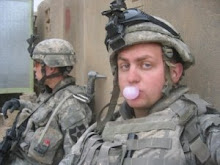The 'awakening group' movement first appeared in Anbar in late 2005 (or if you're John McCain, it started in a time warp before and after the surge) and has since grown to a large, lethal force that battles elements of al-Qaeda in Iraq and the Islamic State of Iraq. That is usually where the media narrative leaves you, insinuating that these groups are patriotic volunteers casting out the demons of al-Qaeda. What they don't mention is both the original motivations for these groups and their history of battling American soldiers. One of the latest to operate (and propped up by my unit in Diyala Province) is the 1920 Revolution Brigade. I covered their nationalist history a year ago, citing their name was a throwback to the 1920 revolution to oust British influence. So this group in particular didn't start in 2005, 2006 or even 2007, but in 2003 for one reason: to attack and kill Americans.
They got pretty good at it. While in Baghdad in late 2006 and early 2007, any group that we battled that wasn't Sadr's militia was likely the 1920s. Their most dramatic act?
Above is the crash site of a Blackwater Security helicopter, downed by the 1920s Brigade. My platoon responded to the crash, found the crew members executed and were caught up in a firefight started by anti-aircraft guns in high rise buildings.
The insurgent group met us head on in Baqubah, being present in the attack that killed my friend and an IED ambush that resulted in four explosions on three Strykers in just seconds. Yet somehow, it was deemed not only acceptable but advantageous to work with these killers. Two months later, we began our first patrols with them.
Without any remorse on our part, many of the 1920s (called "concerned local nationals" at this point) were killed accidentally by our hands at the start of that shaky alliance. American rifle and helicopter fire was the biggest 'concern' of these local nationals until they began wearing reflective belts and brown t-shirts. Some even brought up the notion of killing them once they outpaced their usefulness. Our battalion surgeon, a well respected medical doctor in the civilian world, had the best idea: "kick the Stryker up to sixty and throw them out the open door."
Unfortunately, we couldn't take out the trash that easily. We grudingly worked with the 1920s as per our orders. We were moderately successful in tracking down al-Qaeda operatives (or possibly doing in-house cleaning) and caches. But the point isn't the success of turning over a new leaf with insurgents, though. We traded in our values, our self reliance to get things done, for $300 a head. We did not destroy our enemy but rather aided them. We secured not only their future success, but the future instability with the Iraqi government. Maliki and his Shia government adamantly oppose the Sunni groups and have said in the past that they will never become a permanent part of Iraqi forces.
But they don't pay the former insurgents, we do, as taxpayers. That's why they're trying to leverage the American military into giving them more money, the ol' "pay me more or I'm going back to killing you" ruse. And for their part, they'll probably be successful. Commanders know that they're important not for killing al-Qaeda, but for not fighting us. They're not allies, they're enemies with benefits. And they're holding the cards.
Why isn't there an outcry from the media and citizenry about these people? Quite simply, the military led the media by its nose when they characterized insurgents as "concerned" and proudly spoke of them as volunteers. To further confuse people, they were renamed 'Baqubah Guardians' and then finally 'Sons of Iraq,' each name a brighter shade of lipstick for the same dirty pig. They're only growing stronger and more experienced as time goes on, watching coalition forces close up, looking for every weakness. They've already discovered a big one: our over-reliance on their dirty, sectarian work.
A 1920s member who likely lifted a bullet-proof vest off a dead Iraqi policeman
You can only pay someone not to fight you for so long before they ask for more and more. We're past that point now, and approaching another tough reality on the horizon. If we're as successful as defeating al-Qaeda as the media says we are, who will our new friends fight, if not us?
The very definition of 'a friendship of convenience'
AH

